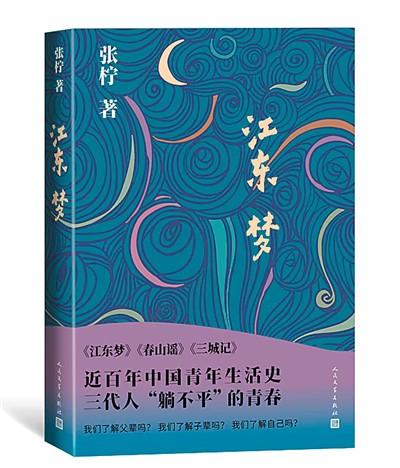
In recent years, Zhang Ning, a scholar, turned to novel creation and published many works one after another. The new work "Dream of Jiangdong" (People’s Literature Publishing House) looks back at the history from the present, and writes the faces of all beings in the background of war, which not only shows the solidarity of the whole people in the war of resistance, but also digs deep into the choice between national justice and personal honor and disgrace when the country is in crisis.
Reading "Jiang Dong Meng" needs to be understood in Zhang Ning’s whole creation. Jiangdong Dream is the third work written by the author on the history of China in the past 100 years after A Tale of Three Cities and Ballads of Spring Mountain. A Tale of Three Cities tells the story of the birth and growth of the post-80s generation, based on the present; "Spring Mountain Ballad" tells the history of the mid-20th century, looking back at the educated youth, until the reform and opening up. "Dream of Jiangdong" focuses on a more distant era, that is, the war-torn years in the 1930s and 1940s. These three works outline the history of China for a hundred years. Zhang Ning’s other work, Biography of the Xuanniao, is a supplement to the trilogy, which explores the mental journey of intellectuals and strengthens the theme of the century-old history of China from one side.
At the beginning of "Dream of Jiangdong", a building named "Demao Apartment" appeared. The author described its appearance in detail and carefully investigated its historical context. The ancient architecture slowly brought out the sense of history and vicissitudes. From prosperity to loneliness, from depression to prosperity, apartments witness the historical changes and the ups and downs of individuals in the times. The novel begins with the escape of a family, and gradually recovers the social features and human sentiment at that time. From the local anti-Japanese war to the full-scale outbreak of War of Resistance against Japan, the historical curtain was opened and the story was told until the end of the war. "Dream of Jiangdong" mainly revolves around two big families: politicians and wealthy businessmen, and involves a huge family system composed of generations of children and grandchildren. With the development of the plot, the characters of the Chua family appeared one after another, and their fate changed, thus deducing the complexity of life. In another family, the story of wealthy businessman Dong Fangjun also slowly unfolded. In the turbulent times, they had to flee for their lives, and finally, under the arrangement of Cai Haosheng, they also lived in Demao apartment.
The vagaries of the world and the contingency of fate are the themes of novels. Someone suddenly leaves and suddenly returns; Began to flee because of the current situation, and continued to do business after a short rest and settlement; It seems that everything is stable and the situation is changing rapidly. There is always a war burning in the story, but the writer skillfully scattered it everywhere, and presented the situation little by little through the exchanges, dialogues, letters, telegrams, telephone calls and psychological activities of various characters, which is a new exploration of war writing.
The value of "Dream of Jiangdong" lies in its daily perspective of people’s lives trampled by Japanese invaders, focusing on people who have taken refuge in the two spaces of Demao Apartment and Grace Cathedral, which shows the tenacious will to survive among the people in China. In addition to forbearance, the work also writes about resistance, the national peril and the great cause of the country concern everyone, and people from all walks of life have contributed their strength to fight against the Japanese aggressors, which shows an indomitable spirit.
At the same time, the writer integrates his children’s affair into the national meaning of his family, and the theme of gathering and parting has the aesthetic feeling of "gone with the wind". The novel is also interspersed with countless little people’s writings, but it is not idle. For example, the image of fortune teller Qian Banxian seems to be a wise man, who knows the world well and is familiar with everyone’s psychology, and his sobriety is revealed by a series of jingles. With the help of this role, the writer interjects and thinks about the differences between men and women’s personalities, the debate about gathering and dispersing, etc., which makes the novel more full.
"Dream of Jiangdong" made the turbulent times stand still for a moment. With the wisdom of scholars, Zhang Ning looks back on the history of China in the past 100 years, reflects on the changes of the times, thinks about the fission of human nature, and shows the national justice. Through family writing, the novel attempts to connect with the literary tradition formed by classic works, and attributes the constancy and change of the world to the theme of dreams, which has distinctive artistic characteristics.
(The author is a researcher at Contemporary Literary World magazine.)